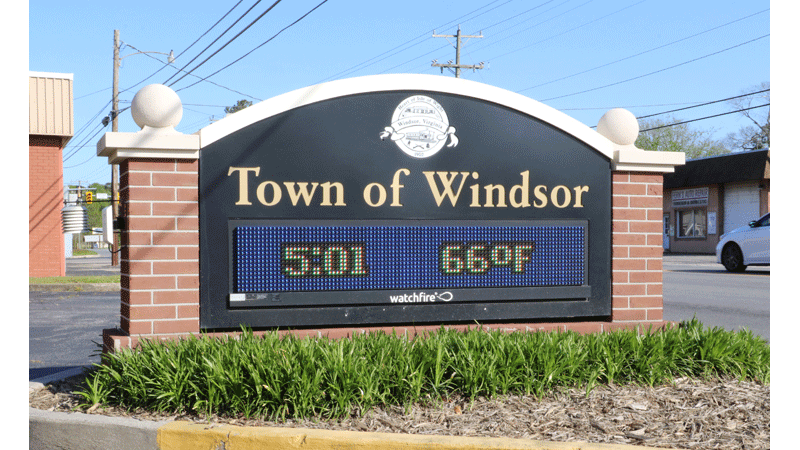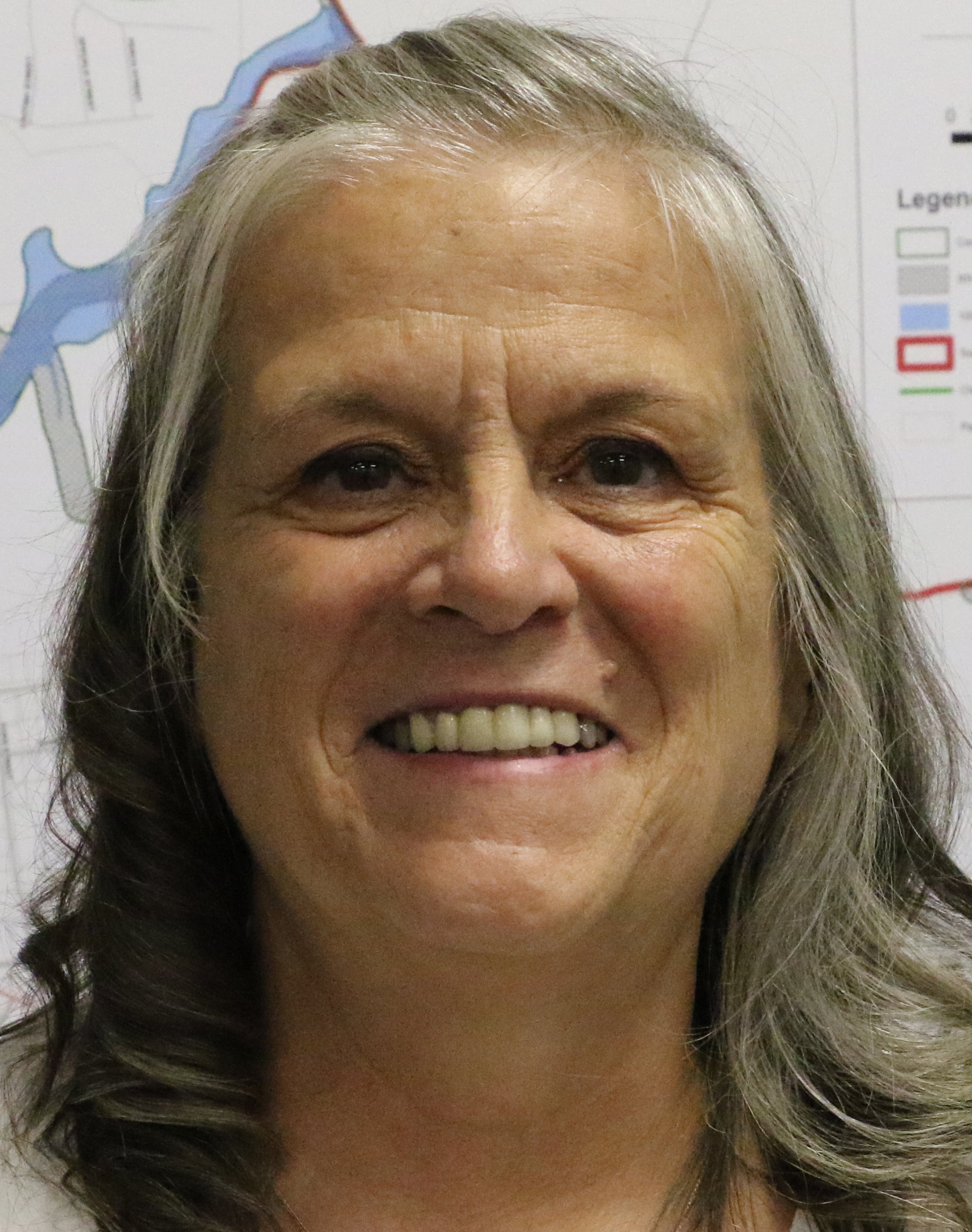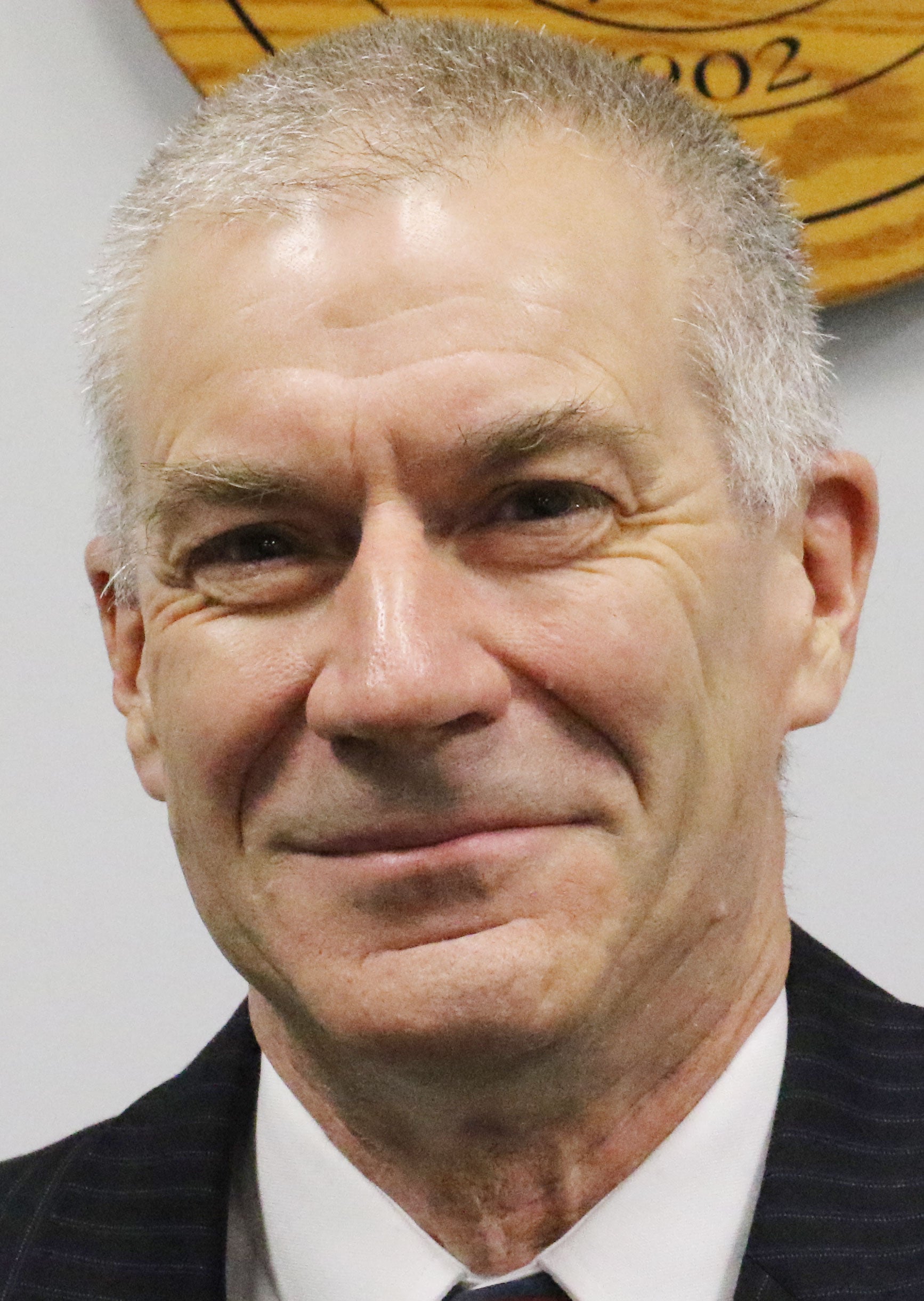Hearings on Windsor budget, tax rates set for May 26
Published 12:34 pm Thursday, May 26, 2022

- This sign marks the location of Windsor Town Hall on 8 E. Windsor Blvd. where the public hearings will be located Thursday, May 26, concerning the town’s proposed FY 2022-23 budget, Capital Improvement Plan, tax rates and water rate. (Photo by Titus Mohler)
|
Getting your Trinity Audio player ready...
|
The town of Windsor will be holding public hearings Thursday, May 26, at Windsor Town Hall concerning the town’s proposed fiscal year 2022-23 operating budget, Capital Improvement Plan, tax rates and water rate.
A public hearing notice from the town noted that the proposed FY 2022-23 budget totals a little more than $5.9 million. It features a general fund of $4,336,149.16 and a water fund of $1,451,775. A total of $100,100 would go to space needs and $50,000 would go to the Windsor Town Center.
After significant discussions across multiple work sessions, most members of the Windsor Town Council agreed that tax rate increases are going to be necessary and that it would be better to act on that need sooner rather than later.
The proposed tax rates for tax year 2022 include a 4-cent increase for three different rates: real estate, service corporations and mobile homes. There is also a proposed 10-cent increase on the cigarette tax.
Lastly, the town is proposing to increase the town water rate by 50 cents per 1,000 gallons.
For tax year 2022, the proposed tax rates are as follows:
- real estate: 14 cents per $100 of assessed value
- service corporations: 14 cents per $100 of assessed value
- mobile homes: 14 cents per $100 of assessed value
- personal property: 50 cents per $100 of assessed value
- machinery and tools: 25 cents per $100 of assessed value
- cigarette tax: 40 cents per pack
- meals tax: 6%
The town’s budget calendar indicates the council will vote to adopt the FY 2022-23 budget and Capital Improvement Plan during its June 14 meeting, but Town Treasurer Cheryl McClanahan stated Thursday, May 19, that there is at least some possibility the adoption could happen Thursday, May 26.
“It could happen Thursday, but most likely they’re going to continue it to (June) the 14th,” she said.
The May 26 special called Town Council meeting will begin at 7 p.m. at Windsor Town Hall, which is located at 8 E. Windsor Blvd. The meeting will include public hearings on the FY 2022-23 budget, the FY 2022-23 budget and CIP adoption ordinance, the FY 2022-23 tax ordinance and the FY 2022-23 water rate ordinance.
As the town’s public hearing notice also stated, full text of the proposed budget and related rate ordinances are available to the public for review at Windsor Town Hall and on the town’s website — www.windsor-va.gov.
During the council’s May 3 work session, Windsor Town Manager William Saunders referred to the public hearing notice when talking to council members, mentioning that he was going to have to write and publish the notice in advance of the May 26 hearings.
“I’m going to have to put a lot of the information from the budget in that public notice, so it would be great if I knew by May 13 which way we were going, specifically as far as tax increases go, to know what’s going to be reflected in that public notice,” he said.
No council member expressed happiness about the possibility of adjusting tax rates upward, but most agreed it was necessary and also preferable to do it sooner rather than waiting and having to make an even larger upward adjustment later. Councilwoman Kelly Blankenship showed the most resistance to increasing tax rates for 2022.
Saunders stated at the May 3 meeting that the water rate increase “really needs to be there.”
Windsor Mayor Glyn T. Willis said, “Is there a disagreement or concern on the water rate?”
Blankenship replied, “If I had to choose one (increase), I’d say the water rate would be one I would lean towards just because (the citizens are) accustomed to water rate increases.”
“And we can still argue that we’re the cheapest in the county,” Willis said.
Saunders said, “Being an enterprise fund, it really has to fund itself.”
“OK, so that one is relatively easy for us,” Willis said. “I guess our hairball is the property tax, and do we kick the can down the road, kick a smaller can down the road or try to take an action now, recognizing that we’re avoiding what would be a bigger can in 12 to 24 months.”
Blankenship later said, “None of us have crystal balls to know in 2024 what the economy is going to look like. Is there going to be any recovery? Are gasoline prices going to go down?”
Saunders noted there could be a recession, and Blankenship speculated that it could even be a depression.
Echoing the general points being made by Saunders and Blankenship, Councilman Walter Bernacki said, “It could be worse, and then you’re going to need (the increases), and then it’s even going to be worse for people.”
Vice Mayor Greg Willis said, “I think a recession is what’s anticipated.”
Councilman George Stubbs said, “I don’t feel like we should kick the can down the road, myself. I understand Kelly’s concerns and everybody elses, and we’re going to hear it, and everybody sitting in here is a resident of town, but I don’t think we should kick it down the road.”
Blankenship said, “If we choose not to kick it, I think we should have some justification.”
She said that if the town is increasing its tax rates, then it should try to put a lid on spending and stop approving a lot of big expenditures, regardless of whether the town needs them or not.
Using a personal example, she said, “I need a new heating and air unit, but I ain’t got no money, so I’ve got to wait…”
Both Blankenship and Mayor Willis emphasized the importance of being up front and clear to the public on why the increases would be happening.
Blankenship gestured to the almost completely empty gallery in the council meeting room during the work session and said, “This is the way it normally is unless you’re talking about senior services. The residents don’t know what we have or haven’t done because I can tell you most of them don’t look at the budget, they don’t look at our numbers, they don’t know. All they know is the bills they get in the mail (and) the letters they get in the mail.
“And if we’re saying that we’re in a situation because, in the past, we haven’t done rate increases, I think we need to be painting a story for the residents to assure the support of the town in the future,” she added.
She emphasized that the story needs to consist of only the facts.
She mentioned having written down the town’s revenue numbers for 2018, 2019, 2020, 2021 and 2022.
“The number keeps incrementally getting bigger, but the expenses are incrementally getting bigger at a bigger increment,” she said.
Councilman J. Randy Carr, the mayor and the vice mayor all highlighted the importance of not overcomplicating the explanation of the gap between revenue and expenses.
“This gap is getting wider and wider with the town,” said Carr, who noted that the town should have been increasing rates all along to address it.
In a May 19 interview, Blankenship summarized the town’s situation for the public.
“While the recent influx of American Rescue Plan Act money during the COVID period has afforded us the opportunity to make some investments in capital improvement projects, it doesn’t negate the fact that we’ve been running in a deficit situation for the last five years, meaning our operational revenue is growing at a slower pace than expenses,” she said. “As a result there have been things we should have been doing that we did not because the budget could not support it, and we cannot continue to do this.”







